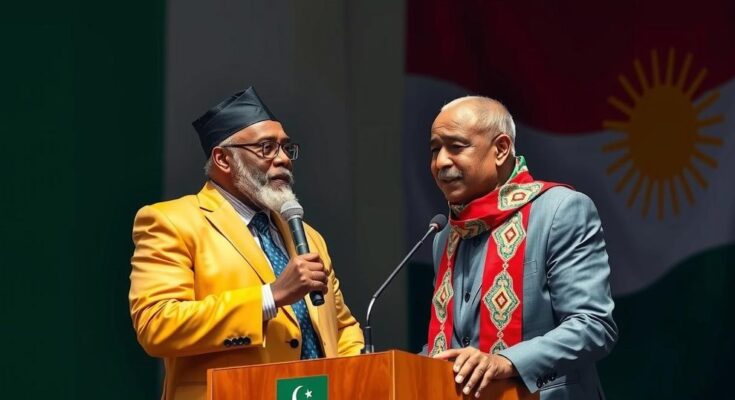Abdirahman Mohamed Abdullahi, known as Irro, has won the presidential election in Somaliland, securing 64 percent of the vote. His campaign prioritizes efforts toward international recognition and economic revitalization. The election, delayed for two years, contrasts Somaliland’s stability with the ongoing conflicts in Somalia. Innovative agreements with Ethiopia may impact recognition efforts, with the new administration hoping for a favorable dialogue with the incoming U.S. government.
Abdirahman Mohamed Abdullahi, commonly referred to as Irro, has been elected president of the self-declared republic of Somaliland, achieving approximately 64 percent of the vote in the recent elections, as reported by local media and The Associated Press. He leads the opposition Waddani Party and has pledged to intensify efforts for international recognition of Somaliland. His main opponent, incumbent President Muse Bihi Abdi of the Kulmiye Party, received about 35 percent of the votes in what was a politically significant election. The elections in Somaliland, which were postponed for two years due to funding issues and other factors, reflect the region’s desire for stable governance amid its quest for recognition since it declared independence in 1991. Despite maintaining a functioning government, currency, and security structure, Somaliland is not recognized by any nation, limiting its access to international financial systems and mobility for its citizens. In addition to their campaign for recognition, both candidates focused on reviving Somaliland’s economy. As President Abdullahi takes office, the administration in Hargeisa is poised to finalize a contentious agreement with Ethiopia for sea access, which is expected to prompt international discussions regarding recognition. This development, however, has raised concerns in Somalia, given the potential violation of its sovereignty. As the new administration anticipates the policies of the incoming U.S. administration under President Trump, there exists a growing hope for a reassessment of U.S. support for Mogadishu over Hargeisa. Notably, some former officials from the Trump Administration have publicly endorsed recognition for Somaliland, which could lead to significant changes in the region’s political landscape. Somaliland’s successful elections demonstrate its commitment to democratic processes and signal potential shifts in regional dynamics as it seeks international legitimacy and stability.
Somaliland, which declared independence from Somalia amidst the civil war in 1991, has developed a stable political framework and governance structure, differing sharply from the ongoing conflicts in Somalia. The region has endeavored for years to gain international recognition as a separate state, despite its lack of formal acknowledgment from the international community. The recent presidential election serves as a crucial moment for Somaliland’s political future, particularly in light of its aspirations for recognition and economic development. Additionally, the expected agreements with Ethiopia may affect diplomatic relations and regional stability.
The recent presidential election in Somaliland has resulted in the victory of Abdirahman Mohamed Abdullahi, who garnered substantial support for his international recognition campaign. As Somaliland continues to uphold its governance structures independently, the outcome signifies potential transformations in its international outlook, especially concerning relations with Ethiopia and the U.S. Moreover, the election reflects Somaliland’s commitment to democratic processes despite not having formal recognition on the global stage. The new government’s policies will be pivotal in shaping the future dynamics of the region.
Original Source: www.aljazeera.com




